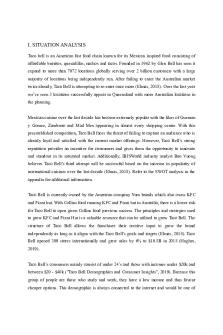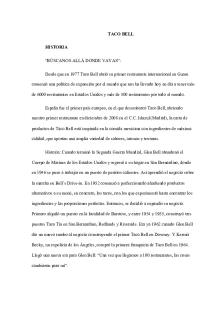Case Study 1 Wrench LLC v. TACO BELL CORP PDF

| Title | Case Study 1 Wrench LLC v. TACO BELL CORP |
|---|---|
| Course | Business Law |
| Institution | Bucks County Community College |
| Pages | 2 |
| File Size | 48.4 KB |
| File Type | |
| Total Downloads | 45 |
| Total Views | 158 |
Summary
Chris Simcox Summer Class - Case Study One; thorough and detailed answer that earned me a 90%. Highly useful...
Description
1. Which court(s) have jurisdiction to hear Wrench's lawsuit? The court who has jurisdiction to hear Wrench’s lawsuit is the Federal Court because the creation of Psycho Chihuahua came from Wrench and was used by Taco Bell with no legal rights. This is a part of the U.S. District Courts which have general jurisdiction and who enroll juries, receive evidence, hear testimony, and decide cases. The state court system does not have jurisdiction because limited-jurisdiction and general jurisdiction trial courts do not pertain to this issue as do intermediate appellate courts and the highest state courts. Limited-jurisdiction trial courts hear matters of a specialized or limited nature and include small claim courts which deal with a dollar amount of $5,00o or less. General-jurisdiction trial courts hear cases of a general nature that are not within the jurisdiction of limited-jurisdiction trial courts and involve felonies or civil cases with a more than certain amount. Intermediate Appellate Courts hear appeals from trial courts and no new evidence or testimony is permitted. Lastly, the Highest State Court hears appeals from intermediate state courts and certain trial courts and no new evidence or testimony is permitted.
2. Do these facts satisfy the requirements for an implied contract? Why or why not? An implied-in-fact contract, also known as a quasi contract, is an agreement between parties that has been inferred from their conduct. The three main facts for an implied contract are (1) the plaintiff provided property or services to the defendant, (2) the plaintiff expected to be paid by the defendant for the property or services and did not provide the property or services gratuitously, and (3) the defendant was given an opportunity to reject the property or services provided by the plaintiff but failed to do so. These facts do satisfy the requirement for an implied contract because Wrench provided property - Psycho Chihuahua - to Taco Bell. Wrench, therefore, expected commission from Taco Bell for use of their creation. Wrench, the plaintiff, proposed terms to Taco Bell for use of Psycho Chihuahua who did reject the terms but further proceeded to use the property.
3. What was the result of this lawsuit?
Rinks and Shields sued Taco Bell to recover damages for breach of an implied-in-fact contract. A federal court jury found that Taco Bell had breached an implied-in-fact contract by stealing Rinks and Shields’ idea for the Chihuahua commercials. The district court ordered Taco Bell to pay a total of $42 million in damages to Rinks and Shields....
Similar Free PDFs

Taco bell translation It
- 1 Pages

Hyde v Wrench Case Summary
- 1 Pages

Marketing plan for taco bell
- 14 Pages

TACO BELL, LO QUE YO Escogi (1)
- 14 Pages

Hertz CORP v Friend - Case
- 1 Pages

Case Brief 9 - Buck v. Bell
- 1 Pages

Bell Atlantic v. Twombly
- 2 Pages

Zapata Corp v. Maldonado
- 1 Pages

Celotex Corp v. Catrett
- 3 Pages

Fisher v Bell - Exams practise
- 2 Pages
Popular Institutions
- Tinajero National High School - Annex
- Politeknik Caltex Riau
- Yokohama City University
- SGT University
- University of Al-Qadisiyah
- Divine Word College of Vigan
- Techniek College Rotterdam
- Universidade de Santiago
- Universiti Teknologi MARA Cawangan Johor Kampus Pasir Gudang
- Poltekkes Kemenkes Yogyakarta
- Baguio City National High School
- Colegio san marcos
- preparatoria uno
- Centro de Bachillerato Tecnológico Industrial y de Servicios No. 107
- Dalian Maritime University
- Quang Trung Secondary School
- Colegio Tecnológico en Informática
- Corporación Regional de Educación Superior
- Grupo CEDVA
- Dar Al Uloom University
- Centro de Estudios Preuniversitarios de la Universidad Nacional de Ingeniería
- 上智大学
- Aakash International School, Nuna Majara
- San Felipe Neri Catholic School
- Kang Chiao International School - New Taipei City
- Misamis Occidental National High School
- Institución Educativa Escuela Normal Juan Ladrilleros
- Kolehiyo ng Pantukan
- Batanes State College
- Instituto Continental
- Sekolah Menengah Kejuruan Kesehatan Kaltara (Tarakan)
- Colegio de La Inmaculada Concepcion - Cebu





